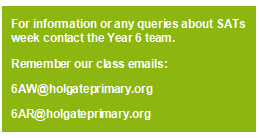year 6 sats

Year 6 SATs Revision Information
What are SATs? At the end of Y6, English school children sit national tests in Reading, Maths and Spelling, punctuation and grammar (SPAG). These tests are both set and marked externally, and the results are used to measure the school’s performance (for example, through reporting to Ofsted and published league tables). Your child’s marks will be used in conjunction with teacher assessment to give a broader picture of their attainment. Writing is not tested but instead assessed through their regular pieces of writing.
The children are working really hard in school to prepare for these. In addition, we have provided here an overview of some additional ways you may wish to support your child at home. Please note, the children will be working very hard in school so our big ask as a school is to ensure your child completes their weekly homework, reads regularly and practices their spelling and times tables at home. We completely appreciate the children need time to rest and relax at home. However, if you wish to support your child more, we have put together a list of ways you may support with this in the coming weeks. In addition, this website page has plenty of activities for children to use.
Writing Revision
For writing the children are not tested but instead teaching staff in school will use the writing they have produced in lessons to look at how they apply their skills in regular practice.
In order to support a child with their writing at home, it would be useful to encourage them to think about the different writing features they know how to include in their writing. Please do not feel the children need to be doing lots of writing at home. Some ways that you may find easier for children to do some writing could be:
- Using purple mash as the children can create information leaflets using the formats on this.
- Encouraging the children to make PowerPoints or information leaflets on a topic they are interested in.
- Writing a diary of what they have done over the holiday.


Reading Revision
Children need to be reading regularly. They can read any types of text but ideally those with words that will challenge them. It may be that they are reading a story, magazine, from a screen or information texts. If, after a child has read, you can discuss with them what they have read and ask about what they have learnt or what has happened that will support them with their understanding.
You can also set up a free oxford owl e-book account. Here is a link and ‘how-to’ guide https://www.oxfordowl.co.uk/for-home
Remember to utilise your child’s Bug Club login as well.
Grammar and Spelling Revision
In recent years, the focus on a pupil’s ability to know and use different grammar terms has been increasingly important, as has their ability to spell words at an appropriate level.
Some of the different ways you can support your child with their grammar and spelling revision are below:
- Each child in year 6 has a list of the 100 year 5/6 key words in their reading diaries.
- Also, encouraging your child to use a dictionary (or an online dictionary) to check any spellings they are unsure of would be really useful to support with this.
- Grammar, punctuation and spelling - KS2 English - BBC Bitesize
- See our SPAG revision page for activities and practice exercises.
Maths Revision
For a child’s maths, the level required has increased over recent years. Some different ideas to support your child with this are:
- Encourage your child to practice their times tables regularly.
- Use times table games on computers and tablets.
- Use Times Table Rockstars to work through some of the activities.
- Maths revision activities and practice exercises can be found on our Maths Revision page.
- KS2 Maths - BBC Bitesize

Wellbeing Support
Steps to take if you’re worried about your child’s wellbeing over SATs.
- Talk to the school – is your child showing the same symptoms at school as they are at home? Is there anything else going on at home which may be contributing to your child’s overall level of stress?
- Work with the school, so everyone concerned can be offering the support that’s needed.
- Spend time with your child. Try to understand what aspect of SATs concerns them most. Is it the worry of ‘failing’? Is it the worry of getting stuck on a paper? If your child can pinpoint what’s bothering them most, you can take specific steps to help reassure them.
- Try not to project your own anxieties or views on the SATs. If you don’t believe in SATs, or do not think your child should be doing them, then neither will they.
- Confront any media coverage. Show clippings if there’s been anything negative and ask them to talk about what they’re seen and how they feel. Reinforce the reality.
- Encourage your child to talk to their teacher. SATs are obviously linked to school, so don’t be surprised if they favour the reassurance of teachers above family members
Please see a useful guide for parents and carers below.

